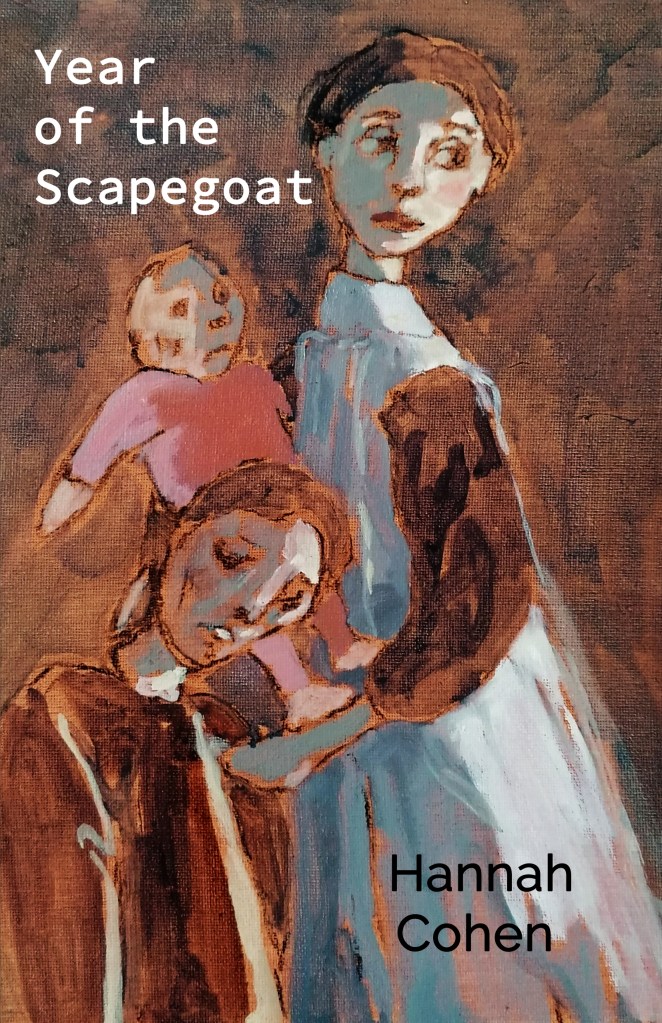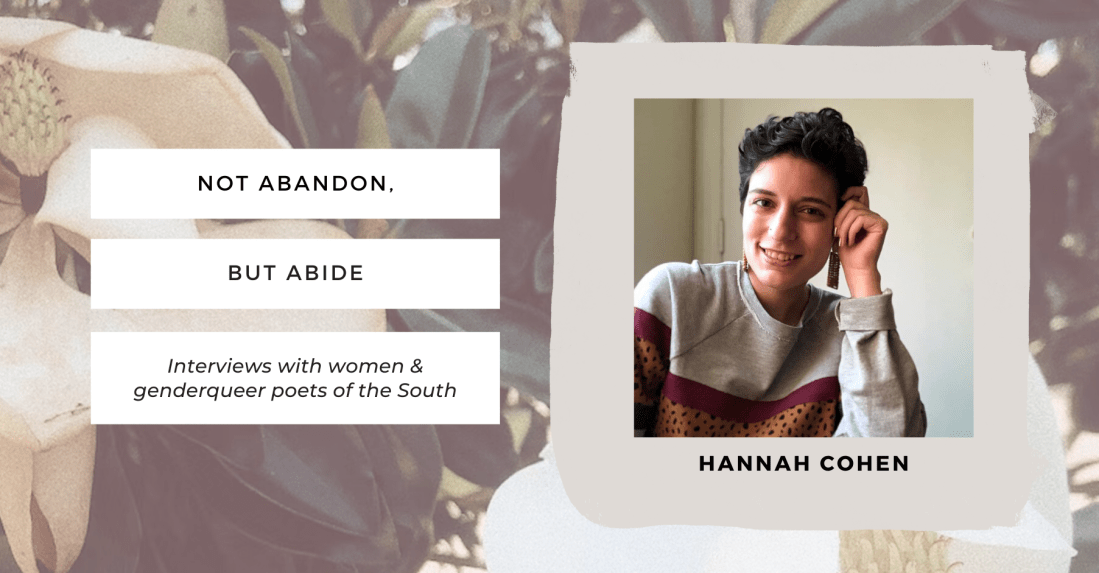The “Not Abandon, but Abide” interview series is dedicated to Southern poets abiding by hope in the South. Their poetry actively resists the notion that we all co-sign the actions of the monoculture. Poetry shakes what we thought we knew.
Hannah Cohen’s Substack is called Eternally Online, and while we talked about her poetry more than her web essays — which are always sharp, alternately funny and despairing — it’s true that I found her on the Internet. Cohen works as a development associate in Lynchburg, Virginia, and she co-founded and edits the journal Cotton Xenomorph, but several years ago, she emerged (at least in my mind) as a bellwether for whatever the Twitter poetry community was talking about that day, a self-styled outsider with a talent for pointing out our tacit blind spots. (I remembered the online harassment she faced in 2018 after asking The Journal to remove offensive work, though we didn’t discuss that here.) Instead, we focused on Cohen’s poetry chapbooks published by Glass Poetry Press: Bad Anatomy (2018) and Year of the Scapegoat (2022), in which the poet pivots from wry to sincere (and back again) with impressive concision.
Cohen’s chapbooks can be read in a pair, as I did, but they are complete in themselves. I imagine that I’m not the only reader to relate to the emotional depths in Bad Anatomy, the voice in these poems that weaves toward and away from sentimental excess: “I love how pure bourbon is. I’m not / Hannah tonight. She’s only the crow in my rib cage” (“Sad Girl’s Drinking Ghazal”). Year of the Scapegoat engages more directly with faith and history, both social and personal: “Even the exodus left me to wreck / and conquer. // All for a heritage / of lack” (“Daughterland”).
This interview took place via email in January 2023.
What would you want someone who’s just meeting you to know about you as a practicing poet? Who (poet or just anyone) has influenced your work?
I want someone to understand that poetry is more than just a practice, but an ongoing evolution of the relationship between the self and the written word. A poet is more than someone who sits down to write — it is how I engage with the world around me, how I view myself and the people in my life. Sometimes I write poems, sometimes I don’t. But it’s always a part of me.
In terms of influence, I could list my proper literary influences like William Butler Yeats, Wislawa Szymborska, Denise Levertov, and Diane Wakoski. But as a teen and young adult in the early-mid 2000s, I read and wrote lots of fanfiction, often collaborating with others to write stories based on my favorite worlds. Writing to an audience that consumed my work and would leave negative reviews if it was poorly written prepared me for the writing life and all its critiques. I would say that part of my life absolutely made me who I am as a writer today, not the MFA degree I received from grad school.
It makes total sense that your first critics were Internet critics. I also think the Internet helped you use tone in interesting ways, such as in “Germination”: “a plastic straw / fell on the floor, and you didn’t want someone to see / you care enough to put it in the trash bin.” I especially see it in your titles, especially those in Year of the Scapegoat: “Death of the Ladies’ Man” and “Ask Me About My Daddy Issues” being two good examples. When does the title happen for you? Before, during writing, long after the poem is composed?
I believe that the titling and ending of a poem are some of the most challenging aspects of writing, and there’s no clear-cut craft advice since it depends on the poem itself. Most of my titles happen during the writing of the poem, rather organically and without a second thought. Other times I’ve changed the poem’s title right before publication, sometimes years after the poem was written. For example, my poem “Esau’s Daughter” in YOTS had a completely different title, but when I was putting together the manuscript, I realized that its old title no longer suited the content or the collection, and I’m much happier with the change.
I’m of the belief that poems are never truly in their final form, because poems can change in different volumes, books, and even in reprints or republication. The poet changes a title, a phrase, a stanza, and it has a new life. Poetry should never remain a static product.
Because I read Bad Anatomy and Year of the Scapegoat side by side, I couldn’t help but compare them or search for a progression. Could you talk about your relationship to “personal” material in these two chapbooks? I ask because to me as a reader, I noticed that YOTS included more narrative facts or biography, yet I wasn’t sure whether that made it more “personal” or than BA, which for me was driven by the lyric speaker.
Bad Anatomy explores an internal landscape of loneliness, mental health issues, and of a female body experiencing those feelings (hence the title poem) in a dream-like sequence. It’s messy, slightly surreal, and there’s more physical locations (driving in a car, hotel rooms, Pennsylvania, and so on) that externalize those emotions. BA allowed me to write about depression, drinking, and other negative emotions through a more inventive and surreal filter without feeling too exposed or confessional. It’s funny, I definitely see the progression of myself as a writer when looking back on those poems — sometimes I wish I had gone deeper into the hurt or pushed myself further with the poetic language or craft, but BA isn’t any less personal. It’s deeply introspective and real. YOTS was a different type of “personal” for me — it was the physicalization of concepts like religious heritage, family relationships, and identity — things that quite literally make up a person. I’ll paraphrase Whitman here: we contain multitudes of material, and every aspect of ourselves inhabits different forms and presentations in our creative work, whether it’s lyrical or concrete expressions of our personality/identity.
I’m also glad you brought up religious heritage, family, and identity. Do you identify as a Southern poet?
In terms of where I was born, raised, and currently living, yes, I’m geographically a Southern poet. It’s specifically because of where I live (in central Virginia) that influenced who I am. As a Jewish person in the South, it can be rather isolating. I live in central Virginia, where a certain bastion of evangelical Baptist Christianity is deep-rooted in local politics and businesses here. I live an hour away where the Unite the Right rally in Charlottesville happened. There’s a lot of pain and struggling I still experience with not only being a religious minority, but an outsider within my own culture — I admit to comparing myself to other Jewish people from traditionally Jewish communities from larger cities, even other Jewish writers. But I wouldn’t change my background for anything. When people ask me why I still live here, I usually answer because of my job or that I have family here. But it’s hard to expect people to understand what it’s like to love a place that doesn’t always love you back.
In “Poem After Reading the Chapter in Stephen King’s It Where the Word ‘Kike’ Appears Six Times”: “Several points of view // and only one house to lock / its door. I was six. That slur born // a child of grief. Who am I to breathe / for the Thomases and Sarahs and Bills // and Catherines of the world…” At this point, you’re in a specific trauma, and yet the poem would appear to want to connect beyond that.
Yes, there were specific moments in my life that informed “Poem After Reading the Chapter…” I was very young when I first heard a slur directed towards me as a Jewish child, and I thought that having such a strong, short sound like ‘six’ would really cement the reality that incidents like these inform and impact our lived reality. As for the names in the poem, I was referencing names from both It (Bill) and names of people I have interacted with over the years, though not specifically those individuals. If the reader is someone who’s experienced discrimination regardless of identity or background, these moments will ring true even if they’re not Jewish.
The intersection between landscape and temporality was one of the pleasures for me in reading both of your chapbooks. Even the really located poems (like “Pennsylvania, 2016”) feel like they could be written anywhere. Or that similar emotions like despair or consumption play out on a loop. But you also write really specific imagery. Is that in tension for you?
“Pennsylvania, 2016” was written when I was staying at a cabin for a week-long intersectional arts residency in Pennsylvania, about an or so hour outside of Philadelphia. I was by myself, in a small room, not speaking to anyone for several hours at a time. When you’re existing in a liminal space such as a residency or a hotel room, you belong nowhere and everywhere. Even if you’ve never been to Pennsylvania, I imagine most readers have experienced liminality in some space or another. It’s how we communicate and verbalize those feelings that make it unique. What some people find despairing or constrictive, others might find freeing.
What are you working on, or what do you want to work on?
These days, I am mostly working on nonfiction. I am working on a series of essays about internet culture and growing up as a Millennial online. I’m fascinated by how rapidly online spaces have changed (and not necessarily for the better) compared to what it used to be. Also, I am writing a novel! It’s a dark comedy fantasy that pokes fun at magic boarding schools and underpaid professors. I also have a short story I’ve been tinkering with for at least a year now; it might be a novel or it might just be its own self-contained universe. I think poetry naturally lends itself to nonfiction because of the space we grant ourselves with writing about personal topics and that our craft is more focused on elevating a narrative. Fiction can often appear more rigid and demanding because there are different craft elements that may not, on the surface, appear in poetry. It’s a fun challenge to switch genres.
Who would you say that your writing community is? Is it mostly online?
Honestly, yes. I don’t live in a big writing/writerly community. I used to do readings in a couple of local spaces pre-pandemic. There’s an MFA program in town that brings some talented poets and writers to give readings each year, but outside of that, there’s not much engagement where I live. I haven’t been to AWP in a couple of years due to finances, time, and lack of a desire to attend. Growing up as an introverted kid on the Internet, so much of my social interactions stem from online spaces and forums. I’ve always felt more comfortable talking to and connecting with people online than in “the real world.”
Read Hannah Cohen’s Substack, visit her website, or follow her @hcohenwriter.

POETRY
Year of the Scapegoat
By Hannah Cohen
Glass Poetry Press
2022

